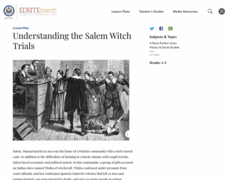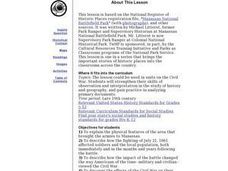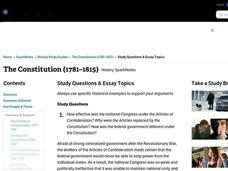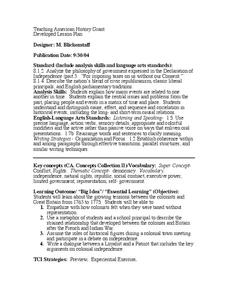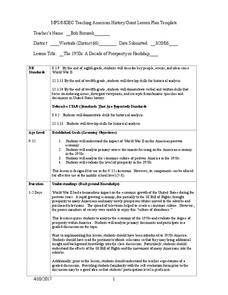Curated OER
What Made George Washington a Good Military Leader? What Are the Qualities of a Good Military Leader?
Students examine the military leadership of George Washington. In this military leadership lesson, students use Internet and print resources to research Washington's military experience and his successful military campaigns. Students...
Curated OER
Anne Frank: Critical Thinking
Young scholars examine the experience of Anne Frank during the Holocaust. Using the text, they discover how propaganda was used to impact the lives of young people in Germany. They answer discussion questions as a class and relate her...
Curated OER
The Battle of Corydon
Fourth graders study the Battle of Corydon, its military leaders, and its influence on the town. In this Battle of Corydon lesson, 4th graders develop vocabulary needed to complete the lesson, listen as the teacher reads The Battle of...
National Endowment for the Humanities
Understanding the Salem Witch Trials
Students describe some of the important elements of life in Puritan New England. They create a timeline of the events of the Salem Witch Trials. They work in groups to explore the concept of multiple interpretations of history.
Curated OER
Manassas National Battlefield Park
Students complete a variety of activities that go along with the study of and possible fieldtrip to Manassas National Battlefield Park in Virginia.
Curated OER
The Constitution (1781–1815)
In this online interactive history worksheet, students respond to 8 short answer and essay questions about the U.S. Constitution. Students may check some of their answers on the interactive worksheet.
Curated OER
North V. South And The Bank Creation
Eighth graders investigate the economic status of America during the 1800's and the role of the bank in the early times of our country. They concentrate on the different jobs that people had in the North and South while classifying them...
Curated OER
Virtual Museum
Ninth graders explore various time-periods in American history. They select important events, people, places, and artifacts to explore. Students present their information to the class using PowerPoint.
Curated OER
Abraham Lincoln
First graders explore famous people in America. They read and discuss a story about Abraham Lincoln. After the class discussion, 1st graders create a web of important events in the life of Abraham Lincoln. Finally, students write...
Curated OER
Truman's Foreign Policy Decisions
Students examine foreign policy decisions of former President Truman which still affect us today, review factors to be considered in making foreign policy decisions, closely explore specific major foreign policy decisions, and share...
Curated OER
Cinco de Mayo
Students identify three celebration activities participated in Cinco de Mayo and explain their significance.
Curated OER
Understanding James Madison The Father of the Constitution
Students research James Madison and create a table of his strengths and weaknesses. For this James Madison lesson, students read Jean Fritz's, The Great Little Madison, while developing their research skills, vocabulary strategies, and...
Curated OER
The Declaration of Independence
Learners empathize with the colonists. In this lesson on the Declaration of Independence, students collaborate to problem solve a school dilemma that enables them to understand the issues and difficulties that occurred in the creation of...
Curated OER
Why Do People Migrate?
For this migration worksheet, students complete tasks about migration including short answer questions, look at pictures, fill in the blanks, and more. Students complete 11 tasks total.
Curated OER
Model United Nations Activity
Students examine current and past problems and situations affecting the United Nations, and explore life, career, and philosophy of Ralph Bunche, American diplomat and Nobel Peace Prize winner. Students then prepare portfolios to...
Curated OER
American Economics after WWII
Students analyze the American culture after WWII. Through a variety of activities, students gain an understanding of ecomonics and prosperity in the US following WWII.
Curated OER
If We Knew Then What We Know Now -- Cuban Missile Crisis (Background)
High schoolers examine the background of the Cuban Missile Crisis. Using the foreign policy decision-making process, they simulate and elaborate the processe involved. They identify the causes of the misconceptions that plagued the...
Curated OER
Colin Powell, a New Adlai Stevenson?: The Cuban Missile Crisis
Students compare and contrast a speech given to the United Nations by Colin Powell and a speech given to the UN by Adlai Stevenson. Clearifying the objective of each, they evaluate their proposals to the United Nations. In groups, they...
Curated OER
Reaching Peace: The Casco Bay Treaty
High schoolers analyze different interpretations of the Casco Bay Treaty Conference. They work in groups and evaluate a section of the Treaty and the terms associated with it. They present their terms to the class and the modern day...
Curated OER
Executive Government: Executive Decision Making
Students explore executive decision making in the federal Cabinet. They are able to explain the need for executive decisions. Students explore how executive decisions are implemented through government departments.
Curated OER
Act of Sabotage?
Students examine animal cruelty laws in Great Britain. In this health lesson, students visit selected websites to research animal cruelty laws as they consider animal rights and hunting rights.
Curated OER
Camera of My Family Video
Students examine the Noren Family's view of life in Nazi Germany. In this discussion lesson students answer twelve questions asked by the teacher.
Curated OER
Reconstruction to Civil Rights
Eighth graders complete a unit of lessons on the period of time from Reconstruction to the Civil Rights movement. They analyze and interpret political cartoons and editorials, conduct research on famous civil rights places, and complete...
Curated OER
Historical Perspective
Students research the different perspectives of important groups and figures involved in the American Revolution and apply their findings to write and perform monologues depicting this pivotal time in history.



